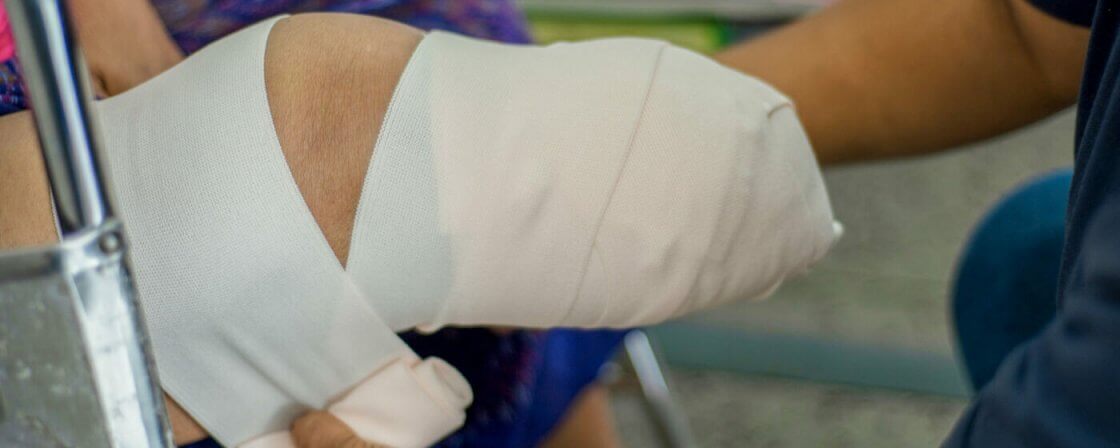Request for contribution
Mrs. Klara takes care of her father, who is 86 years old. He suffers from a serious form of diabetes and had to have his leg amputated. Dad is basically permanently bedridden. He is attended by a rehabilitation nurse, and with the help of relatives he moves longer distances with a mechanical wheelchair, and with the support of an adult and a French cane he takes a few steps around the bed. He also needs help from his daughter or other relatives for basic hygiene, meal preparation and other routine activities. The prognosis for her health is uncertain. The father has been fitted with a prosthesis, but due to the poorly healing wound it is not suitable for him and rehabilitation with it is now impossible.
On the advice of a nurse, they applied for a care allowance. This is generally intended for people over one year of age whose long-term adverse health condition requires the care of another person to manage the basic needs of life.
The allowance is provided on the basis of the Social Services Act and the implementing decree. Its amount is graded according to whether the dependency is mild, moderate, severe or total dependency on another person, and an adult may be granted an allowance of between CZK 880 and CZK 27 000 per month according to the dependency, with CZK 27 000 for Grade IV+ (total dependency with care outside residential services, i.e. typically in the home environment); in Grade IV it is CZK 23 000. These amounts apply from 1 July 2024 and remain unchanged in 2025.
Tip for article
Tip: We have also written a separate article on How to get a care allowance with all the details on the amount and the criteria for assessing it.
With her help, Klára’s father, Mr Antonín, wrote an application for a care allowance, which he submitted to the relevant office of the Czech Social Security Administration (ČSSZ) according to his place of residence, or he could also submit it electronically via the JENDA application. The process was a little more complicated than he had anticipated. First, he was contacted by a social worker, with whom he arranged a visit for the following week. The social worker spent a total of about 40 minutes in the home. She inspected the flat, the bedroom and the sanitary facilities, and with her questions she checked whether Mr Antonín was able to prepare his own food, what his options were in terms of hygiene, dressing, whether he was able to transport himself to the door, call for help, etc. Mr Antonín answered that he was unable to do most of the things himself, as he was practically bedridden. All the time the social worker took notes and at the end of the visit she said that she was forwarding the findings of the investigation to the district social security administration for a medical assessment.
Approximately three weeks later, Mr Antonín received a decision from the Czech Social Security Administration granting him the lowest level of care allowance, i.e. light dependency. The decision described the general condition of a lower limb amputation, where rehabilitation, the use of a prosthesis and, subsequently, the patient’s almost complete self-sufficiency were expected. However, the applicant’s advanced age was allegedly taken into account, among other things, and for that reason the allowance was granted at all.
Are you solving a similar problem?
Do you need help with filing an administrative claim or representation in court?
Do you need help with filing an administrative claim or representation in court? We will be happy to help you with everything. We will conduct a thorough analysis, assess your realistic chances and suggest a course of action. All within 48 hours of ordering services.
I want help with legal representation
- When you order, you know what you will get and how much it will cost.
- We handle everything online or in person at one of our 6 offices.
- We handle 8 out of 10 requests within 2 working days.
- We have specialists for every field of law.
Appealing against a decision on care allowance
If your claim for care allowance is rejected or awarded at a lower level than you expected, you can appeal under the Administrative Procedure Code. You have 15 days to appeal. On the 15th day you can still submit your appeal at the post office.
Tip for article
Tip: From April 2025, the care allowance agenda will move from the Labour Office to the Czech Social Security Administration. The move is expected to bring greater clarity and faster processing of applications. It will now also be possible to process everything electronically via the JENDA application, which will allow you to submit an application, monitor its progress and communicate with the office remotely. For families who are already caring for their loved ones, this means a reduced administrative burden and the possibility of dealing with everything from the comfort of their own home, without having to visit the office repeatedly.
Although you are appealing to the Czech Social Security Administration (ČSSZ), its handling and a new decision fall under the jurisdiction of the Ministry of Labour and Social Affairs, to which the ČSSZ will forward the entire file within 30 days of receiving the appeal (unless it proceeds by self-medication)
In the appeal, first of all, identify yourself (i.e. the person who applied for the care allowance). Give your name, surname, date of birth and place of residence or other address for service. Identify the decision against which you are appealing (who made the decision, when it was made and the reference number) and describe why you disagree with the decision and what you are proposing (for example, that the findings do not correspond to reality and that you are requesting an increase in the allowance). If you can attach evidence, please do so. This could be, for example, medical reports confirming the actual state of health and the prognosis for the future. Do not forget to sign the appeal.
Mr Antonín himself filed an appeal, but did not raise any new facts and the appeal was dismissed. He therefore contacted our legal services through his daughter to ask if anything more could be done in the case.
Filing an administrative action
Another defence in such a case is to bring an action in the administrative courts. This can only be brought once an appeal has been exhausted. An administrative action must be brought before the regional court in whose district the claimant resides or is present. The time-limit of two months from the date of service of the decision against which the action is brought must be complied with. In general, the proceedings on the action are subject to a court fee of CZK 3 000 (but individual fee exemptions are possible)
It is not necessary to be represented by a lawyer in court proceedings, but it is certainly advisable to at least consult with a lawyer and prepare the application. By drafting the claim correctly, your chances of success are significantly increased and in such a case you can recover the costs of the lawyer within a month.
An administrative action is formally similar to a previous appeal. It must be clear what it is about, who is making it, who made the decision it relates to and what is being proposed. A copy of the contested decision is attached.
We had Mrs. Klara describe her father’s health again and compared it with the table that is also used by reviewing doctors. It describes ten basic needs of life, including: mobility, orientation, communication, eating, dressing and putting on shoes, physical hygiene, performing physiological needs, health care, personal activities, and household care. If three to four of these needs are unmanaged, the first level of allowance is eligible, if 5-6 it is the second level, the third level has 7-8 and the fourth level, i.e. full dependence, implies 9-10 unmanaged needs.
In the administrative action, we described the discrepancies between the actual condition and the assessment and had Mr. Antonin’s physician explicitly confirm the medical prognosis with respect to his age. In practice, there can be a diametric difference in the rehabilitation of a thirty-year-old athlete who has had his leg amputated and a nearly ninety-year-old gentleman with diabetes and other ailments following the same medical procedure. But according to the opinion, this was not taken into account.
Judgment of the Administrative Court
The Administrative Court does not decide what level of care allowance will be awarded. The court will only confirm or annul the decision of the administrative authority by judgment (or, if the action is not well-founded, the court will dismiss it). If the decision is annulled, the matter is then heard again by the Ministry of Labour and Social Affairs, which is bound by the legal opinion of the regional court.
The Regional Court overturned the decision of the Ministry of Labour and Social Affairs and the Ministry decided in the new hearing to grant the benefit in stage III where the dependency is severe. Mr. Antonín was able to include additional paid labour in his care, thus relieving Ms. Klara of her responsibilities.
Tip for article
Tip: In recent years, amendments that increase the amounts of the care allowance itself have also been discussed and gradually approved. As of July 2024, the allowances in tiers II, III and IV have been increased, and as of 2026, the previously very low allowances in tiers I and II are to be automatically raised. For example, for adults, Tier I should be CZK 1,300 and Tier II CZK 5,400 per month. Although this is a step in the right direction, experts point out that the amounts still do not reflect the actual costs of care and that carers often have to cover most of the costs out of their own pocket.




